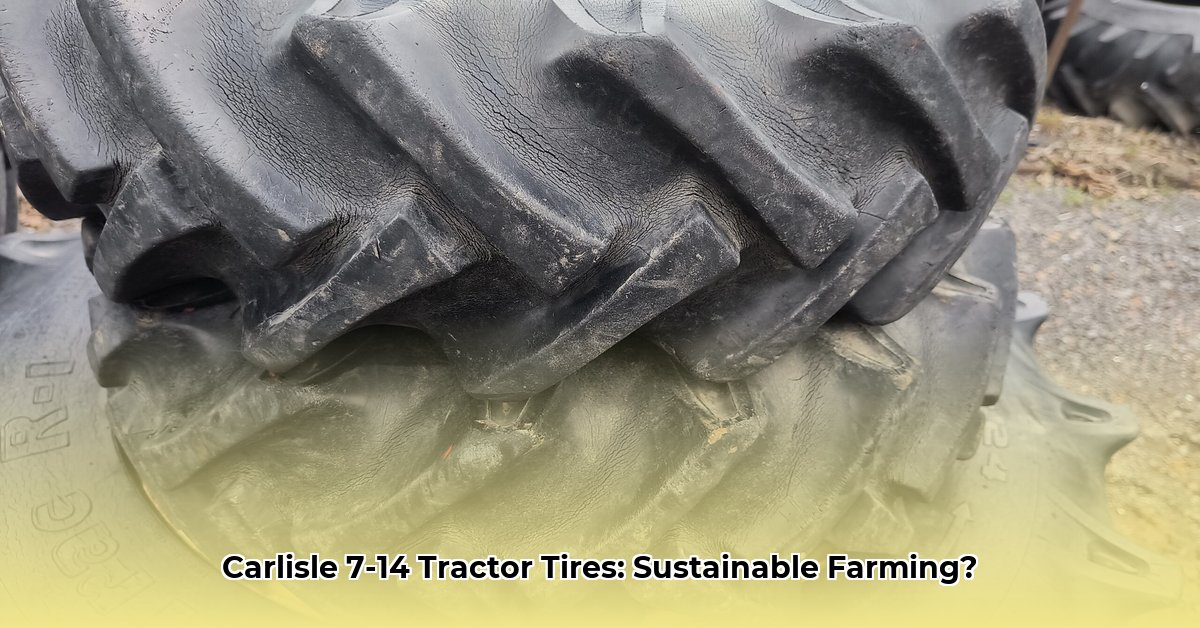
7-14 Tractor Tire: A Comprehensive Review for Sustainable Farming
Choosing the right tractor tires significantly impacts farming efficiency and sustainability. This review analyzes the Carlisle 7-14 Farm Specialist tire, examining its features, performance, and environmental implications to help you determine its suitability for your operation. We'll explore available data and highlight crucial information gaps, emphasizing the need for more research to fully assess its long-term value. For more tire size options, check out this helpful resource.
Getting to Know the 7-14: Specs and Features
The Carlisle 7-14 features a multi-angle, long-bar tread pattern designed for grip across various soil types. Its maximum inflation pressure is 36 PSI. This size is relatively standard, offering compatibility with numerous tractors; however, always verify compatibility with your tractor's manual. While the design suggests versatility, independent testing across diverse soil conditions (e.g., heavy clay, sandy loam) is lacking, limiting a definitive assessment of its performance capabilities. (Imagine a photo of the tire here)
Performance in the Field: What We Know, and What We Don't
The manufacturer claims good performance across diverse soil conditions. However, the absence of independent testing prevents a conclusive evaluation of its performance in specific scenarios. Anecdotal evidence exists, but without broader testing, these accounts remain insufficient for a comprehensive assessment. This lack of data is a significant limitation for farmers seeking to make informed purchasing decisions. Isn't it concerning that such a crucial piece of information is missing?
The Sustainability Angle: A Crucial Consideration
Sustainable farming necessitates minimizing fuel consumption and environmental impact. The 7-14's contribution to sustainability remains uncertain due to a lack of data on its rolling resistance. Lower rolling resistance translates directly to fuel savings and reduced emissions. Furthermore, information regarding the sourcing and recyclability of the tire's materials is absent, hindering a complete sustainability analysis. How can we assess the true environmental impact without this critical information?
Comparing the 7-14 to its Competitors: A Challenging Task
Direct comparisons with competing tires are difficult due to a general scarcity of consistent, reliable data across brands. This makes it challenging to objectively evaluate the 7-14's strengths and weaknesses relative to alternatives. Standardized, independent testing across the industry is vital for improved decision-making by farmers. Wouldn't standardized testing benefit everyone in the long run?
Real-World Feedback: The Value of User Reviews
While user reviews offer valuable insights, the currently limited number of verified reviews for the 7-14 prevents the drawing of definitive conclusions. More farmer feedback is needed to provide a more comprehensive understanding of its real-world performance. Isn't it frustrating to have limited user reviews to guide your decisions?
Addressing the Data Gap: A Call for Action
The lack of data on rolling resistance, long-term durability, and the sustainability of its manufacturing process significantly hampers a complete evaluation. This gap underscores the need for:
1. Independent Testing: Rigorous testing by unbiased third parties is crucial to provide farmers with reliable performance data.
2. Transparent Reporting: Tire manufacturers should proactively share detailed specifications and performance data, acknowledging any limitations.
3. Standardized Testing Protocols: The industry needs to adopt standardized protocols to evaluate key factors impacting both performance and sustainability.
What You Can Do: Moving Forward
To improve the assessment and aid future buyers, these steps are recommended:
1. For Farmers: Share your experiences with the 7-14. Specify soil types, weather conditions, and observed performance.
2. For Carlisle and Tire Distributors: Invest in and publish independent testing results. Provide detailed specifications and sustainability information.
3. For Research Institutions: Develop and promote standardized testing protocols for agricultural tires.
Weighing the Pros and Cons: A Summary
| Pros | Cons |
|---|---|
| Versatile tread design (potential) | Limited independent performance data |
| Potentially affordable | Uncertain long-term durability |
| Wide availability | Lack of detailed sustainability data |
The Carlisle 7-14 shows promise but lacks sufficient data for a complete evaluation. Increased research and transparency are critical for informed purchasing choices and the advancement of sustainable farming.